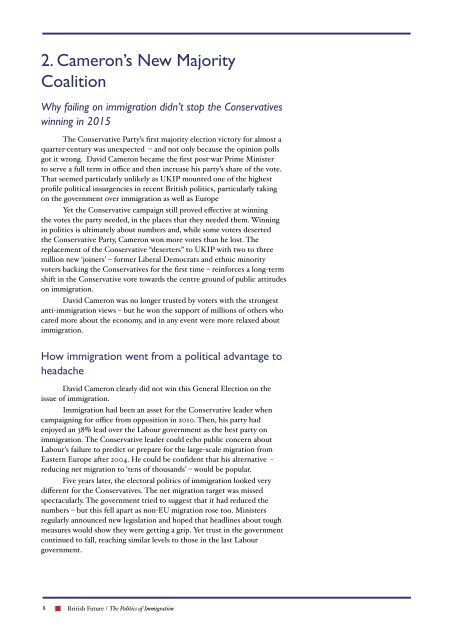THE POLITICS OF IMMIGRATION
The-politics-of-immigration
The-politics-of-immigration
You also want an ePaper? Increase the reach of your titles
YUMPU automatically turns print PDFs into web optimized ePapers that Google loves.
2. Cameron’s New Majority<br />
Coalition<br />
Why failing on immigration didn’t stop the Conservatives<br />
winning in 2015<br />
The Conservative Party’s first majority election victory for almost a<br />
quarter-century was unexpected – and not only because the opinion polls<br />
got it wrong. David Cameron became the first post-war Prime Minister<br />
to serve a full term in office and then increase his party’s share of the vote.<br />
That seemed particularly unlikely as UKIP mounted one of the highest<br />
profile political insurgencies in recent British politics, particularly taking<br />
on the government over immigration as well as Europe<br />
Yet the Conservative campaign still proved effective at winning<br />
the votes the party needed, in the places that they needed them. Winning<br />
in politics is ultimately about numbers and, while some voters deserted<br />
the Conservative Party, Cameron won more votes than he lost. The<br />
replacement of the Conservative “deserters” to UKIP with two to three<br />
million new ‘joiners’ – former Liberal Democrats and ethnic minority<br />
voters backing the Conservatives for the first time – reinforces a long-term<br />
shift in the Conservative vote towards the centre ground of public attitudes<br />
on immigration.<br />
David Cameron was no longer trusted by voters with the strongest<br />
anti-immigration views – but he won the support of millions of others who<br />
cared more about the economy, and in any event were more relaxed about<br />
immigration.<br />
How immigration went from a political advantage to<br />
headache<br />
David Cameron clearly did not win this General Election on the<br />
issue of immigration.<br />
Immigration had been an asset for the Conservative leader when<br />
campaigning for office from opposition in 2010. Then, his party had<br />
enjoyed an 38% lead over the Labour government as the best party on<br />
immigration. The Conservative leader could echo public concern about<br />
Labour’s failure to predict or prepare for the large-scale migration from<br />
Eastern Europe after 2004. He could be confident that his alternative -<br />
reducing net migration to ‘tens of thousands’ – would be popular.<br />
Five years later, the electoral politics of immigration looked very<br />
different for the Conservatives. The net migration target was missed<br />
spectacularly. The government tried to suggest that it had reduced the<br />
numbers – but this fell apart as non-EU migration rose too. Ministers<br />
regularly announced new legislation and hoped that headlines about tough<br />
measures would show they were getting a grip. Yet trust in the government<br />
continued to fall, reaching similar levels to those in the last Labour<br />
government.<br />
8 British Future / The Politics of Immigration


